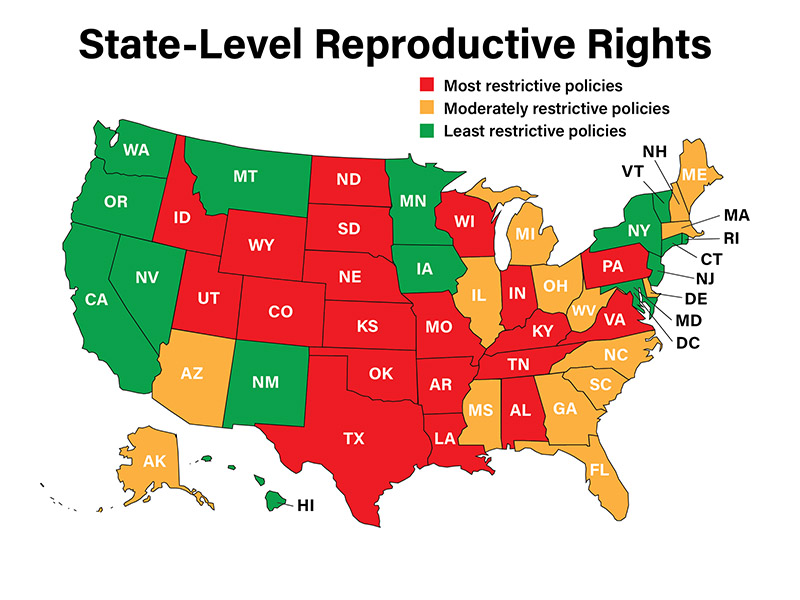When reproductive rights are less restrictive, babies are born healthier

This map indicates the reproductive rights policy climate for each state plus the District of Columbia in the year prior to when women gave birth in 2016 (i.e., preconception year). Data were compiled in 2014 and 2015 (Credit: Elsevier)
The study found that women, particularly US-born Black women, in states with restrictive reproductive rights policies deliver more low birth weight babies and experience greater health inequities. This project is a collaborative between researchers at the School of Public Health at UCLA and the Mary Amelia Center at the Tulane School of Public Health and Tropical Medicine, a center that take conducts interdisciplinary research to identify and disrupt barriers to knowledge, opportunity, and health for women and their communities while addressing inequities in health across the lifespan.
The study is connected to a larger project lead by Dr. Maeve Wallace, associate director at the Mary Amelia Center, with support from postdoctoral fellow, Dr. Dovile Vilda, which seeks to identify the impact of state-level policies on maternal and child health. Drs. Wallace and Vilda assisted in conceptualizing the study and oversaw the analysis of the data presented in this publication.
American women living in states with less restrictive reproductive rights policies are less likely to give birth to low-birth weight babies. Compared to infants of normal weight, low birth weight newborns may be more at risk for numerous health problems. Some infants may become sick in the first six days of life or develop infections. Other children may suffer from long-term problems, including delayed motor and social development or learning disabilities.
The study, published in the December 2020 edition of the American Journal of Preventive Medicine, found that mothers, particularly U.S.-born Black women, giving birth in states with less restrictive reproductive rights policies have a 7% lower risk of low-birth weight babies, compared to women in states with more restrictive policies.
“Our study provides evidence that reproductive rights policies play a critical role in advancing maternal and child health equity,” said May Sudhinaraset, associate professor of the UCLA Fielding School’s Department of Community Health Sciences. “Addressing the adverse consequences of structural racism requires examination of the historical and present-day policies that negatively affect women of color.”
Compared with women living in states with the most restrictive reproductive rights policies, women living in the least restrictive states had a 7% lower risk of low-birth weight babies. Low-birth weight risk for newborns was 8% lower among Black mothers living in states with the least restrictive reproductive rights policies, compared with their counterparts living in the most restrictive states.
The study analyzed birth record data for the nearly 4 million births that occurred in the 50 states and the District of Columbia in 2016 to assess the associations between reproductive rights policies and adverse birth outcomes.
The study indicates that expanding reproductive rights may actually decrease the risk of low-birth weight babies, particularly for US-born Black women. Specifically, the findings showed significant associations between low-birth weight newborns and states’ reproductive rights climate among U.S.-born, but not foreign-born, Black women.
“Legislation and judicial actions attempting to curtail women’s reproductive rights are occurring at an unprecedented rate, in the absence of evidence on the potentially negative impacts to women and children’s health,” said Dr. Wallace. “This work demonstrates the harm caused by restricting women’s rights, which includes limiting access to the information and resources needed to exercise voluntary choice about whether and when to have children, and the ability to raise healthy children in safe and supportive environments.”
